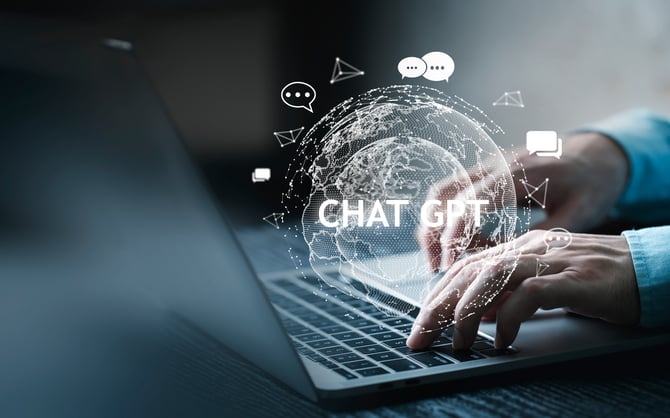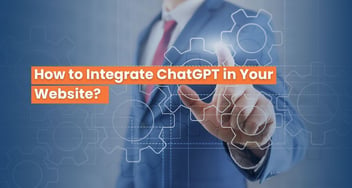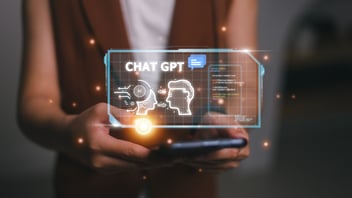Top Industries That Could Benefit from ChatGPT
CEOs and students are all abuzz about ChatGPT, an AI chatbot that can generate human-quality text. ChatGPT is being used for a variety of purposes, from writing blog posts to creating marketing materials. So, what does the future hold for AI? Our article addresses everything for you!

ChatGPT is a revolutionary technology trained to learn what humans mean when they ask a question. This LLM (Large Language Model) has attracted 10 million users in the first two months after its roll-out, cementing its footsteps as the fastest user-growing web platform.
First-time users encountering ChatGPT and other LLM are awed at its capability to give human-quality responses, inspiring the feeling that it may soon rule the roost, as how humans interact with computers and change how information is retrieved.
Its potential impact on the digital ecosystem, especially in the realm of digital content and information technology, is profound. Though not all industries can implement the technology and witness immediate results, CIOs in the industries have the most to gain and the agility to do it quicker.
Join us as we delve into the remarkable impact and opportunities that ChatGPT development services bring to different industries!
💡 Key Takeaways:Let's explore the remarkable growth and diverse industry applications of ChatGPT. Here are the key takeaways:
|
Our blog includes everything you should know, along with the most pressing question -
“Will ChatGPT-style technology augment the human workforce in the coming decades, as the invention of calculators did for Mathematicians?"
Here’s the answer! But first, let's understand the basics!
Let's Understand What is ChatGPT?
ChatGPT is an AI-driven Natural Language Processing tool that facilitates human-like conversations, code writing, storytelling, and more. Powered by the Generative Pre-training Transformer (GPT) architecture, it comprehends natural language structures and patterns, offering coherent responses.
GPT means “Generative Pre-training Transformer” and is an AI-driven language model. Meanwhile, “Pre-Trained” denotes that it’s based on voluminous data of text/words, allowing it to understand the structure and pattern of natural language.
Its “transformational” structure has layers that can prioritize phrases and words in every input. The model “residual connections” and “feed-forward layers” help in understanding the complex patterns and context, resulting in better and more coherent responses.
Herein, you’ll find all the key statistics circumscribing AI, especially the buzzword - ChatGPT, which is presently taking the world by storm. From user base share to capturing the lion’s share to projected revenue, you’ll see a host of amazing facts that promise to keep the future of business green.
How Big is the Artificial Intelligence Market?
- According to Precedence Research, the entire value of the AI market is projected to reach $ 150+ billion dollars by 2023, growing to as much as $1.5 trillion by 2030.
- As of January 2023, ChatGPT, an AI-powered chatbot, is primarily used by 902 companies worldwide, varying from technical, education, and manufacturing industries to federal, media, and entertainment. 27% of these companies are technical, 23% are in the educational segment, 10.9% are business companies, and less than 10% are manufacturing companies.
- When putting ChatGPT’s exceptional user acquisition into perspective, TikTok took nine months to reach a similar number of users. Whereas other phenomenally successful apps took much longer to achieve this - Instagram took 2.5 years, Facebook took around 5 years, Canva took 9 years to reach 100 million users. Whereas ChatGPT achieved this in merely 60 days.
Simply put, ChatGPT shows no sign of slowing down. Here are real-world examples to advocate the breakthrough—that is around the corner!
Exploring Industry Applications
Let’s see how this technology is helping businesses grow their bottom line and enhance their user experience.
1. Pharmaceuticals
Researching and creating new medicines has been time-consuming. It takes approximately ten years for medicine to reach the market and another six to seven years to conduct human trials.
- Expedited Time to Market - Fortunately, the debut of ChatGPT expedited the time to market as it has the potential to collect data from multiple parallel treatment plans. Plus, it quickly creates insights and correlations from the voluminous data points to understand clinical trial outcomes better.
- Customer Management: A ballpark estimation that 66 percent of all U.S. adults - more than 131 million people - use prescription drugs. The FDA receives more than 100,000 reports of medicinal errors every year from health organizations, hospitals, pharmacists, and patient homes. So, rather than being connected to an agent while getting a prescription rewritten, ChatGPT or any similar technology - with a translating text-to-speech engine and different private training data behind it - will help customers precisely fill their prescriptions.
2. Banking & Finance
Within three months after the rollout of the beta version of ChatGPT being opened to the public, bankers were feeding it text prompts about exceptionally niche subjects like employee retention credits, creating financial polls, gamification of deposits, and much more. This gold rush paved the way for the following use cases that were completed:
-
Personalized Financial Advice: ChatGPT analyzes customer data to offer tailored financial guidance, improving customer satisfaction.
-
Legal Contract Creation: It assists in drafting precise legal contracts and streamlining legal processes.
- Fraud Detection— Identifying frauds and eliminating malpractices is another area in banking and financial services where ChatGPT is important. This is done by analyzing customer behavior that led to fraud in the past and then applying these patterns to forecast potential fraudulent activity and create Suspicious Activity Reports (SAR).
3. Wealth Management
The deficit in staffing has left numerous industries balked, including finance. According to a Charles Schwab survey, financial advisors found that AI recruiting and retaining talent has been the top priority for the first time since 2006, leading many to turn to AI recruiting tools.
- Customer Assistance: Extends the bandwidth of customer representatives with enterprise-specific data sets.
- Role Augmentation: Assists but doesn't replace human roles in sensitive transactions.
ChatGPT can be used as a representative with enterprise-specific data sets to help and assist customers. After all, providing efficient, high-level financial guidance could significantly extend the bandwidth of customer representatives.
Don’t worry; ChatGPT won’t eliminate the roles of those with access to sensitive financial information or carrying out transactions on customers’ behalf. It lacks the crucial foundational context - for instance, the customer’s account balance or trends of the customer’s financial history - to make precise insights.
Simply put, enterprise incarnations of transactional, conversational, or LLMs harnessing RLHF (Reinforced Learning from Human Feedback) can take more prominent roles, with implications for switching jobs presently performed by humans.
4. Automotive
Increasing commodity prices and supply chain pitfalls have had repercussions on the automotive industry for quite a long time.
- Market Analysis: Tracks industry trends and predicts market changes for informed decisions.
- Efficiency Improvement: Analyzes data to enhance operational processes and efficiencies.
However, CIOs can leverage ChatGPT as a research tool to track industry trends, analyze the market for future predictions, and understand competitive supply chain processes to ensure they are using the right procedures daily to mitigate losses.
Entrepreneurs and industry giants - They can also use ChatGPT to analyze large datasets and processes. Often, this improves the creation and maintenance of elements like catalogs, operational procedures, and manual processes to unleash new efficiencies. Besides, it could also be used to create large knowledge capitals for new providers, who often slip through the thinnest gap of incumbent providers.
5. Sales & Marketing
ChatGPT benefits marketing professionals by optimizing the extent of customization they offer to their customers through content.
- Content Optimization: ChatGPT assists in keyword analysis, copywriting, A/B testing, and customer feedback collection for improved content optimization.
- Keyword Analysis: ChatGPT analyzes textual data to identify popular keywords, enhancing SEO and content strategy.
- Copywriting: ChatGPT simplifies the copywriting process, enabling the creation of interactive and compelling marketing content with minimal human intervention.
- A/B Testing: ChatGPT facilitates A/B testing by generating two distinct versions of product descriptions, allowing for dynamic campaign insights from different focus groups.
- Customer Feedback: Incorporating ChatGPT into product-focused platforms automates the collection and resolution of customer feedback and grievances, enhancing user experience.
- Marketing Automation: The global marketing automation market is forecasted to reach $25.1 billion by 2023, driven by the increasing adoption of AI-powered tools for personalized customer engagement.
- Lead Conversion: AI-driven chatbots like ChatGPT can increase lead conversion rates by up to 30% by providing timely responses and personalized interactions with potential customers.
6. Healthcare
Undoubtedly, there are untold numbers of applications of AI in healthcare. So, conversational AI is highly beneficial in making healthcare processes more efficient and patient-friendly.
Here's some real example of how that is possible:
- Patient Records Summary: ChatGPT simplifies patient record summarization, providing a comprehensive view of medical history for accurate insurance claim processing.
- Patient Triage: ChatGPT facilitates expedited diagnoses by analyzing patient credentials and symptoms, offering potential diagnoses and recommended treatment steps swiftly.
- Medical Transcription: ChatGPT enhances medical transcription accuracy, facilitating quicker clinical decision-making.
- Patient Care: It aids in patient appointment scheduling, medical information dissemination, and diagnosis assistance, improving healthcare delivery.
- Healthcare AI Market Growth: The global healthcare AI market is projected to reach $19.25 billion by 2026, driven by the increasing adoption of AI technologies for medical imaging, diagnostics, and patient care.
- Patient Outcomes: Hospitals using AI-driven technologies like ChatGPT have seen a 30% reduction in patient wait times and a 40% increase in patient satisfaction scores, highlighting the positive impact on healthcare delivery.
7. Retail:
- Customer Support: ChatGPT can enhance customer support services by providing instant responses to inquiries, assisting in product recommendations, and resolving issues efficiently.
- Personalized Shopping Experience: It analyzes customer preferences and behaviors to offer personalized shopping experiences, increasing customer satisfaction and retention.
8. Hospitality:
- Concierge Services: ChatGPT can act as a virtual concierge, assisting guests with bookings, providing local recommendations, and answering queries about amenities and services.
- Feedback Collection: It automates the process of collecting guest feedback, enabling hotels and resorts to gather valuable insights for improving guest experiences.
9. Education:
- Personalized Learning: ChatGPT can provide personalized learning experiences by generating custom study materials, answering student queries, and facilitating interactive learning sessions.
- Tutoring Assistance: It helps educators provide personalized tutoring assistance to students, addressing their learning needs and reinforcing concepts.
9. Telecommunications:
- Customer Service: ChatGPT improves customer service in the telecommunications industry by resolving technical issues, assisting with account management, and providing product information.
- Sales Support: It assists sales representatives in prospecting, lead qualification, and providing product recommendations based on customer inquiries.
10. Real Estate:
- Property Search Assistance: ChatGPT helps users find properties based on their preferences, providing information about listings, prices, and neighborhood amenities.
- Virtual Tours: It facilitates virtual property tours, allowing potential buyers or renters to explore properties remotely and ask questions in real time.
11. Legal Services:
- Legal Research: ChatGPT aids legal professionals in conducting legal research, analyzing case laws, and drafting legal documents with greater efficiency and accuracy.
- Client Communication: It enhances client communication by responding to legal inquiries in a timely manner, scheduling appointments, and updating case statuses.
Conclusion
ChatGPT's popularity underscores AI's transformative potential in various sectors. As technology advances, its impact on society will continue to grow, presenting countless opportunities for innovation and improvement. If you want to leverage AI's capabilities and stay ahead, start with a conversation.
So, if you want to be the forerunner, unleash the potential that creates buzz and excitement, and leverage its impeccable capabilities, just remember—everything starts with a conversation.


%201-1.webp?width=148&height=74&name=our%20work%20(2)%201-1.webp)


.png?width=344&height=101&name=Mask%20group%20(5).png)








.jpg?width=352&name=Traditional%20vs.%20ChatGPT%20Chatbots%20(1).jpg)








